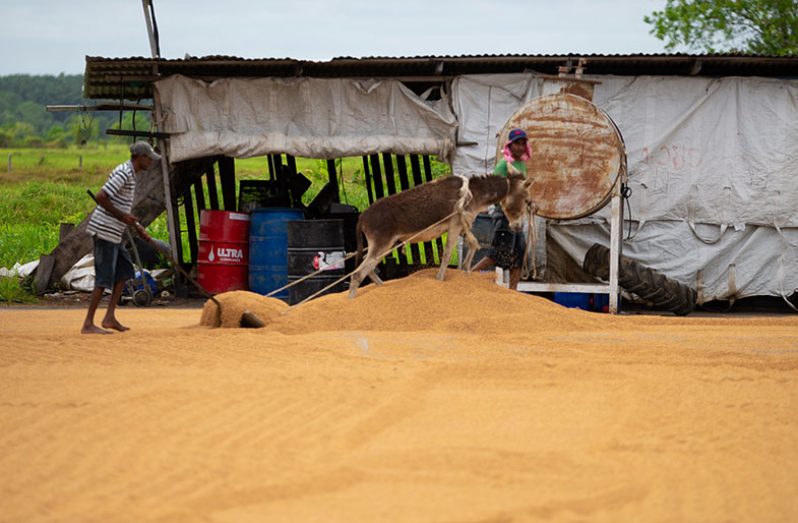One of Leguan’s few rice millers tells his story
HE was not more than 10 years old when he began helping his father at the rice mill. Lachmie Persaud Doobay and his siblings – 12 of them in all – were taught by their dad everything that the business entails. From going into the fields, planting, drying the paddy, feeding the mill – everything they were taught to do according to the “longtime system.”
Doobay, one of the few rice millers on Leguan Island, who is popularly known as ‘Coachie’, took over the business from his father, Resaul Persaud Doobay (now deceased), about 20 years ago and has been running it almost single-handedly since then.

The older Doobay was young when his close Chinese friend ‘Sue Chuk’ persuaded him to buy the business. ‘Sue Chuk’ had bought it but after a year or two, he was no longer interested. It was then that Mr. Doobay joined with his brother and cousin to make the purchase.
After about two years, Mr. Doobay’s partners left the business. He managed, though, despite being young and having a large family to care for.
The business progressed and came to be known as the ‘LP Doobay and Rajiv Doobay Rice Milling Complex’, located in Doorn Haag Village, at the back end of the island.
“I remember helping him to do everything,” Coachie recalled during an interview with this publication at his rice mill. He added: “Whenever there was a shortage in the workforce, we the children filled in…to steam paddy in the longtime system; dip paddy in the soaking tank. We had to go into the soaking tank and dip with buckets, and all these things we did at a very young age, when we were around eight, nine, or 10 years old.”
Mr. Doobay taught his children to work hard from a very tender age. “Me and my brothers can do anything; we can break and make anything. Everything in this rice mill I built myself. Even some of the machinery I built myself,” Coachie said.
Coachie and some of his siblings went to school in Georgetown but during the holidays, they would return to the island and help out with the business.
Reflecting on his father, Coachie said: “He was a person always determined to get things done, and he never gave up.” And it is this kind of attitude that helped Coachie to continue working on the business, even though things have gotten very hard on him.
“When I started 20 years ago, things were so good. For the first 10 years, it was extremely good and you could have made a profit. But now, you’re working like a slave and making nothing. The overhead expenses are too much. Right now, we are looking at all corners to see where we can cut costs. If we have an oversized motor here, we take it out and try to put the size that is needed to reduce the amount of current we use,”Coachie expressed.
He said that he teaches himself many things and picks up skills as he goes along with the business. “If I don’t do work myself, I don’t know how I would keep surviving because the costs are killing. We built everything locally right here,” he said.

Coachie produces ‘Dewani’ and about five other varieties of the long grain rice. “The Dewani rice is a special rice; it boils faster. The other variety doesn’t boil so quickly; doesn’t paste up,” he said.
He supplies to various supermarkets on the West Coast Demerara and also has some customers in the neighbouring Wakenaam Island. “It’s me alone here, so I can’t spread myself as much. We used to supply rice to Georgetown, but it’s hard for me to do everything.”
Coachie recalled that in times past, there were employees who would put themselves out and work to build the business. “Today, workers are just working for the money. There is no interest. If I’m not at home, no production goes on, so I can’t spread myself out too far. In addition, numerous persons who owe money are not coming forward to pay.
Coachie would love if something can be done about fuel prices at the moment. “It’s killing us and perhaps government can look at lowering the taxes on fuel or give concessions to rice farmers or millers; some form of duty free concession for diesel. At least give us a cutoff point, be it 10,000 gallons or whatever, after which you buy at the regular gas stations.”
Continuing to reflect on the days when he just started, Coachie said: “We used to pay like $5,000 for a drum of diesel and when you check from the price that you buy paddy, to the price that you sell rice, we have that same margin now. But then, we paid $5000 for a drum; now we paying $55,000 for a drum. When we used to buy a pair of screens for the mill, we used to pay less than $1,000. Now, we are paying $15,000. So everything went up; even a simple elevator bolt and lubricants.”
In 2015, when Guyana lost the Venezuelan market, Coachie was especially affected. He said he was left stuck with 21,000 bags of paddy. “So you’re talking about more than $20 million that went down the drain there. Those things can nail you. We had to mill the rice and sell it cheaper than what we bought the paddy for,” he said.
According to Coachie, a number of problems can be solved for him and other rice farmers if the overhead costs are reduced.











